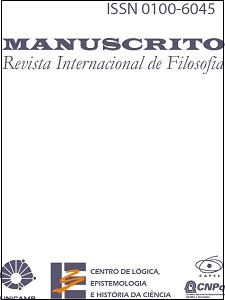Resumo
A central part of Frege's logicism is his reconstruction of the natural numbers as equivalence classes of equinumerous concepts or classes. In this paper, I examine the relationship of this reconstruction both to earlier views, from Mill all the way back to Plato, and to later formalist and structuralist views; I thus situate Frege within what may be called the “rise of pure mathematics” in the nineteenth century. Doing so allows us to acknowledge continuities between Frege's and other approaches, but also to understand better the motivation and the significance of his innovations, as well as their limits.Referências
ARISTOTLE. The Complete Works of Aristotle. J. Barnes (ed.). Princeton University Press, 1984.
BLANCHETTE, P. “Frege’s Reduction”. History and Philosophy of Logic, 15, pp. 85-103, 1994.
BOSTOCK, D. Logic and Arithmetic, Vol. 1: Natural Numbers. Oxford: Clarendon Press, 1974.
CARNAP, R. Der Raum. Ein Beitrag zur Wissenschaftslehre, Kant-Studien, Ergänzungshefte, Nr. 56, H. Vaihinger (ed.). Frischeisen-Köhler & Liebert, 1922. DEDEKIND, R. Was sind und was sollen die Zahlen?. Braunschweig: Friedrich Vieweg, 1888. English trans. The Nature and Meaning of Numbers. In: Essays on the Theory of Numbers. New York: Dover, 1963, pp. 31-115.
———. Gesammelte Mathematische Werke. R. Fricke et al. (eds.). Vieweg, Braunschweig, 1932, v.3.
DEMOPOULOS, W. Frege’s Philosophy of Mathematics. Cambridge, MA: Harvard University Press, 1995.
EUCLID. The Elements. Edited and trans. T. Heath. New York: Dover, 1956.
FINE, K. “Cantorian Abstraction: A Reconstruction and Defense”. The Journal of Philosophy, 95, pp. 599-634, 1998.
FREGE, G. Die Grundlagen der Arithmetik. Breaslau: Verlag von Wilhelm Kobner, 1884. English trans. The Foundations of Arithmetic. Edited and trans. by J.L. Austin. Chicago: Northwestern University Press, 1980.
———. Grundgesetze der Arithmetik. Vols. I and II. Jena: Pohle Verlag, 1893/1903. Reprinted Hildesheim: Olms, 1998.
FREUDENTHAL, H. “Zur Geschichte der Grundlagen der Geometrie. Zugleich eine Besprechung der 8. Auflage von Hilbert’s ‘Grundlagen der Geometrie’”. Nieuw Archief voor Wiskunde, 4, pp.
-42, 1957.
———. “The Main Trends in the Foundations of Geometry in the 19th Century”. In: E. Nagel, P. Suppes, and A. Tarski (eds.). Logic, Methodology, and Philosophy of Science. Stanford University Press, pp.
-21, 1 GRAY, J. “The Nineteenth-Century Revolution in Mathematical Ontology”. In: D. Gillies (ed.). Revolutions in Mathematics. Oxford: Oxford University Press, pp. 226-47, 1992.
HALE, B. & WRIGHT, C. The Reason’s Proper Study. Essays towards a NeoFregean Philosophy of Mathematics. Oxford University Press, 2001.
HODES, H. “Logicism and the Ontological Commitments of Arithmetic”. The Journal of Philosophy, 81, pp. 123-49, 1984.
HUME, D. A Treatise on Human Nature. L.A. Selby-Bigge (ed.). Oxford: Clarendon Press, 1988.
IFRAH, G. The Universal History of Numbers: From Prehistory to the Invention of the Computer. New York: John Wiley & Sons, 2000.
KANT, I. Critique of Pure Reason. Edited and trans. by N.K. Smith. St. Martin’s Press, 1965.
KLEIN, J. Greek Mathematical Thought and the Origins of Algebra. New York: Dover, 1968.
LEWIS, D. Parts of Classes. Oxford: Basil Blackwell, 1991.
MILL, J.S. A System of Logic, reprinted (excerpts). In: E. Nagel (ed.). Philosophy of Scientific Method. New York: Hafner Publishing Company, 1950; (1843).
PLATO. Philebus. In: E. Hamilton and H. Cairns (eds.). The Collected Dialogues of Plato. Princeton: Princeton University Press, pp. 1086- 50, 1989.
RECK, E.H. “Frege’s Influence on Wittgenstein: Reversing Metaphysics via the Context Principle”. In: W.W. Tait (ed.). Early Analytic Philosophy: Frege, Russell, Wittgenstein. Chicago: Open Court, pp. 123- 85, 1997. 962. ———. “Freges Platonismus im Kontext”. In: G. Gabriel & U. Dathe (eds.). Gottlob Frege: Werk und Wirkung. Paderborn: Mentis, pp. 71- 89, 2000.
———. “Dedekind’s Structuralism: An Interpretation and Partial Defense”. Synthese, 137, pp. 369-419, 2003.
RECK, E. and PRICE, M. “Structures and Structuralism in Contemporary Philosophy of Mathematics”. Synthese, 125, pp. 341-83, 2000.
REICHENBACH, H. The Rise of Scientific Philosophy. Berkeley and Los Angeles: University of California Press, 1951.
RHEINWALD, R. Der Formalismus und seine Grenzen. Königstein: Hain, 1984.
ROCHE, J.J. The Mathematics of Measurement. New York: Springer, 1998.
RUFFINO, M. “Why Frege would not be a neo-Fregean”. Mind, 112, pp. 51-78, 2003.
RUSSELL, B. “The Logic of Relations”. Rivista di Matematica, vol. VII, pp. 115-48, 1901. Reprinted in R.C. Marsh (ed.). Logic and Knowledge. Essays 1901-1950. London: Routledge, 1956.
———. Principles of Mathematics. London: Allen and Unwin, 1903. Reprinted New York: Norton, 1953.
———. Introduction to Mathematical Philosophy. London: Allen and Unwin, 1919. Reprinted London: Routledge, 1993.
SIMONS, P. Parts. A Study in Ontology. Oxford: Clarendon Press, 1987.
STEIN, H. “Logos, Logic, Logistiké: Some Philosophical Remarks on Nineteenth-Century Transformations of Mathematics”. In: W. Aspray and P. Kitcher (eds.). History and Philosophy of Modern Mathematics. Minneapolis: University of Minnesota Press, pp. 238- 59, 1988.
STEINER, M. The Applicability of Mathematics as a Philosophical Problem. Cambridge, MA: Harvard University Press, 1998.
TAIT, W.W. “Frege versus Cantor and Dedekind: On the Concept of Number”. In: M. Schirn (ed.). Frege: Importance and Legacy. Berlin: de Gruyter, pp. 70-113, 1997.
———. “Noesis: Plato on Exact Science”. In: D. Malament (ed.). Reading Natural Philosophy: Essays in the History and Philosophy of Science and Mathematics. Chicago: Open Court, pp. 11-31, 2002.
TETENS, H. “Arithmetik: ein Apriori der Erfahrung?” In: B. Falkenburg (ed.). Naturalismus in der Philosophie der Mathematik? Hamburg: Meiner, pp. 125-46, 1994.
WILSON, M. “Frege: The Royal Road from Geometry”. Nous, 26, pp. 149-80, 1992.
WITTGENSTEIN, L. Remarks on the Foundations of Mathematics. In: G.H. v. Wright, R. Rhees & E. Anscombe, (eds.). Oxford: Basil Blackwell, 1978, 3rd edition.

